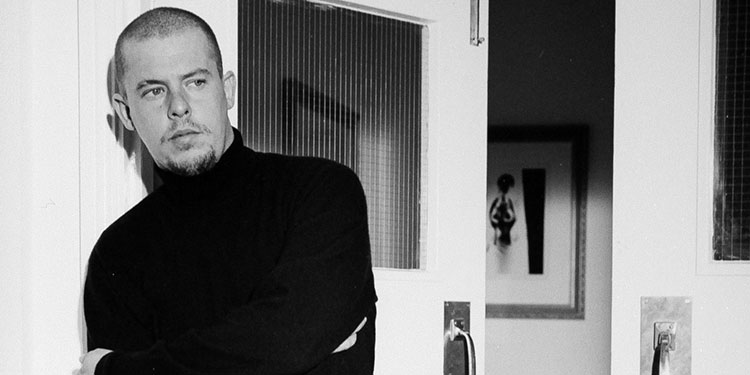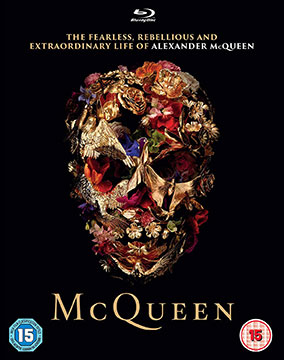
Director: Ian Bonhôte, Peter Ettedgui
Running Time: 111 mins
Certificate: 15
Release Date: October 22nd 2018

I’ve often thought that if I ever had enough money that I could spend it on high end fashion, the first place I’d head is for Alexander McQueen. While in this documentary the fashion label’s namesake and founder, Lee Alexander McQueen, says in an archive interview that he can’t see the brand going on without him as the driving force, following his untimely death it has continued to find success and present the unique McQueen style thanks to the creative direction of his right hand person, Sarah Burton.
The documentary itself focuses on Lee, following his story from working class East End London lad through his apprenticeship in Savile Row, MA at Central St. Martin’s, founding his own fashion label in his early 20s, his appointment as Creative Director at Givenchy and on through the growth of the Alexander McQueen brand thanks to a partnership with Gucci. It does this via extensive archive footage as well as interviews with those closest to him, including his sister and nephew, along with the circle of friends and colleagues who worked alongside him over the years.
The film puts the designer into context beyond the simplistic mythologizing (which he was somewhat complicit with despite his protestations to the contrary) of McQueen as the ‘enfant terrible’ of fashion, a working class kid bashing down the barriers of an elitist world, or more recently as a guy with drug problems who killed himself. It’s a surprisingly moving and sometimes exhilarating film, filled with passion and vigour. It’s structured around several of McQueen’s catwalk shows (for both his own label and Givenchy), starting with his MA graduate collection, which was called ‘Jack The Ripper Stalks His Victims’, through the controversies of ‘Highland Rape’ and ‘The Horn Of Plenty’, along with the astonishing and legendary ‘Voss’, and on to the last show he oversaw, ‘Plato’s Atlantis’.
It’s a smart way of doing it, because while many insiders like to talk about high end fashion as art, to outsiders it often looks more like impractical decadence and elitist pretentiousness. However, watching and hearing about how Lee worked, as well as seeing footage from his catwalk shows, it’s difficult not to feel he was as much performance artist as fashion designer. While at the time some dismissed his theatrical, sometimes shocking shows as attention seeking or excessive, seen together here they are astonishing pieces of art in their own right. It also allows the film to look at what a collaborative process putting together one of his collections had to be, while also showing that as with many ‘geniuses’, he could sometimes be difficult and not always realise that loyalty is a two-way street.
It is a fascinating look at the man, with the only issue being that in trying to avoid cliché it perhaps underplays aspects of McQueen’s life that were more important than presented here. For example, while it doesn’t ignore the fact he was gay by any means (ex-boyfriends are interviewed and there’s footage of him talking about it and how it affected his relationship with his father), it treats it as largely an irrelevance to the broader story it’s telling. However, many would say this was a key aspect of how Lee viewed the world and his role within it, particularly his constant view of himself as an outsider, but also someone who never accepted that there was something he couldn’t do just because society said it wasn’t for people like him. Likewise, the film talks about his issues with drugs, but again they are compartmentalised into a relatively brief section and rarely mentioned outside that, despite many saying they had a profound impact of him and his work.
By doing this, it ensures that the film avoids becoming yet another tale of a gay guy who was filled with angst, took lots of drugs/alcohol and then killed himself. In lesser hands, that’s exactly what it would have become, going for the easy but hoary melodrama of a tortured genius whose story ends in tragedy. However, rather like McQueen’s fashion, while all the ingredients for that are here, the way they’re put together create a very different feel and focus. It’s not a film about what we lost when Lee died, but about what we have because of him, as well as the world that surrounded him which still goes on. That said, it does mean certain things are side-lined that some may feel shouldn’t be. Indeed, it’s an interesting question as to whether McQueen’s admirable attempts to avoid ‘kill your gays’ tropes, ends up slightly sanitising its subjects sexuality?
These are minor annoyances though compared to how impressive everything else about the documentary is. It manages to be both intimate and yet expansive, focusing exclusively on one extraordinary person’s life while simultaneously asking questions about the nature of fashion, art and a creators’ place in that. What it also does without mentioning it at all, is underline how McQueen was not just about fashion, but was perhaps the best of the so-called ‘Young British Artists’ (Damien Hirst, Sam Taylor-Wood, Tracey Emin etc.) who emerged in the 1990s.
Overall Verdict: A fascinating and sometimes exhilarating look at a man for whom fashion truly was art. It may slightly sideline certain aspects of his life, but it makes up for it with its moving testament to a fashion icon and what he meant.
Reviewer: Tim Isaac
Leave a Reply (if comment does not appear immediately, it may have been held for moderation)